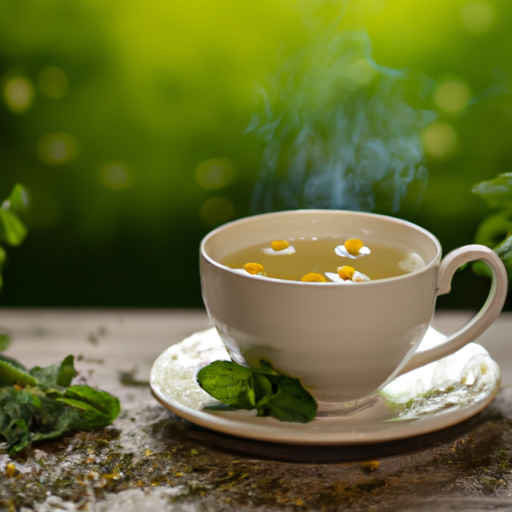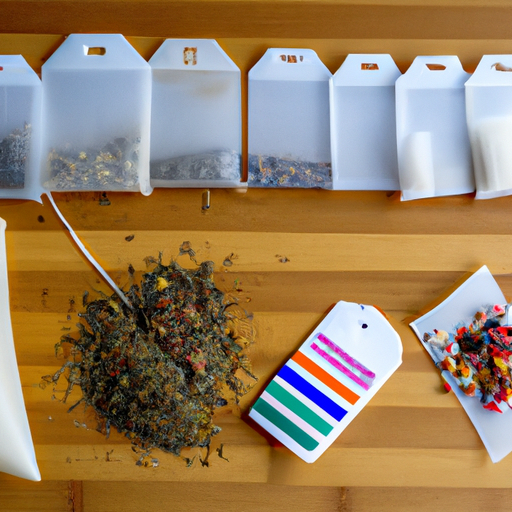Are you tired of feeling bloated and uncomfortable after a meal? Do you wish there was a natural and gentle way to relieve gas and promote digestion? Look no further than herbal tea.
Herbal teas have been used for centuries to soothe various ailments, and when it comes to gas, they can work wonders. In this article, I will guide you through the best herbal teas that are known for their gas-relieving properties.
Peppermint tea is a popular choice for easing gas and bloating, thanks to its ability to relax the muscles of the gastrointestinal tract.
Chamomile tea is another great option, as it soothes the stomach and promotes digestion.
If you’re a fan of spicy flavors, ginger tea could be your go-to, as it aids in digestion and reduces inflammation.
Fennel tea is also highly recommended, as it helps relax the muscles in the digestive tract and relieves gas.
Lemon balm tea and dandelion root tea are two more herbal teas that can effectively alleviate gas. Lemon balm tea calms the stomach and reduces bloating, while dandelion root tea supports liver function and aids in digestion.
Lastly, a blend of peppermint and fennel tea can provide a powerful combination of gas-relieving properties.
So, if you’re looking for a natural and effective way to relieve gas, try incorporating these herbal teas into your daily routine. Your digestive system will thank you!
Key Takeaways
- Peppermint tea relaxes the muscles of the gastrointestinal tract and relieves gas.
- Chamomile tea soothes the stomach, promotes digestion, and reduces bloating.
- Ginger tea aids in digestion, reduces inflammation, and alleviates gas and bloating.
- Fennel tea relaxes the muscles in the digestive tract and stimulates the production of digestive enzymes.
Peppermint Tea
Feeling bloated and uncomfortable? Try sipping on a cup of peppermint tea—it’s a fantastic choice for soothing your tummy and relieving gas!
Peppermint tea is well-known for its numerous health benefits, and one of them is its ability to ease digestive issues. The main active ingredient in peppermint tea is menthol, which has antispasmodic properties that help to relax the muscles in your gastrointestinal tract, reducing gas and bloating.
To make peppermint tea, start by boiling a cup of water. Once the water’s boiling, add 1 tablespoon of dried peppermint leaves or a peppermint tea bag to a mug. Pour the boiling water over the leaves or tea bag, and let it steep for about 5-10 minutes. You can sweeten the tea with honey or a natural sweetener if you’d like.
Apart from relieving gas, peppermint tea also has other benefits. It can help with indigestion, nausea, and even headaches. However, it’s important to note that if you have gastroesophageal reflux disease (GERD), peppermint tea may worsen your symptoms. So, if you suffer from GERD, it’s best to consult with your healthcare provider before consuming peppermint tea.
Now, let’s move on to another herbal tea that can help with gas and bloating: chamomile tea.
Chamomile Tea
Brewing a cup of chamomile can help alleviate stomach discomfort. Chamomile tea is known for its numerous health benefits, including its potential to relieve bloating and gas. This herbal tea contains compounds that have anti-inflammatory properties, which can help soothe the digestive system and reduce bloating.
Additionally, chamomile tea has been found to relax the muscles of the gastrointestinal tract, helping to relieve gas and ease stomach cramps. One way chamomile tea benefits digestion is by reducing inflammation. The anti-inflammatory properties of chamomile can help calm and soothe the digestive system, reducing discomfort and bloating.
Another benefit of chamomile tea is its ability to relax the muscles of the gastrointestinal tract. This can help relieve gas and reduce stomach cramps, allowing for better digestion and less discomfort.
In addition to its digestive benefits, chamomile tea is also known for its calming properties. Drinking chamomile tea can help relax the body and mind, reducing stress and promoting a sense of well-being. This can be especially beneficial for individuals who experience digestive issues related to stress or anxiety.
Transitioning to the subsequent section about ginger tea, another herbal tea that can help alleviate gas and bloating, we can explore its unique properties and benefits.
Ginger Tea
Ginger tea, with its distinct flavor and warming properties, can be a soothing remedy for digestive discomfort and bloating. Ginger has been used for centuries in traditional medicine for its numerous health benefits. One of its main benefits is its ability to alleviate gastrointestinal issues, such as gas and bloating. The active compounds in ginger, such as gingerol and shogaol, have anti-inflammatory and antioxidant properties that can help reduce inflammation in the digestive system.
To make ginger tea, start by peeling and grating a fresh ginger root. Then, add about 1 tablespoon of grated ginger to a cup of boiling water. Let it steep for about 5-10 minutes, depending on how strong you prefer your tea. You can also add a squeeze of lemon or a teaspoon of honey for added flavor.
Drinking ginger tea regularly can help improve digestion and prevent gas and bloating. It can also help relieve nausea and promote overall digestive health. However, it’s important to note that ginger tea may not be suitable for everyone, especially those with certain medical conditions or who are taking certain medications. It’s always best to consult with a healthcare professional before incorporating ginger tea into your routine.
Transitioning to the subsequent section about fennel tea, another herbal tea that can help alleviate gas and bloating…
Fennel Tea
Fennel tea, with its aromatic and licorice-like flavor, can be a soothing and effective remedy for reducing bloating and improving digestion. Fennel tea benefits include its ability to relax the muscles in the gastrointestinal tract, which can help alleviate gas and bloating. It’s also known to stimulate the production of digestive enzymes, which aids in the breakdown of food and promotes better digestion.
To make fennel tea, start by crushing one teaspoon of fennel seeds in a mortar and pestle to release their natural oils. Then, add the crushed seeds to a cup of boiling water and let it steep for about 10 minutes. You can strain the tea before drinking or simply allow the seeds to settle at the bottom of the cup.
Not only does fennel tea offer relief from gas and bloating, but it also provides other health benefits. It’s a good source of antioxidants, which can help protect the body against damage from harmful free radicals. Additionally, fennel tea has been used traditionally to alleviate menstrual cramps and promote lactation in breastfeeding women.
Transitioning into the subsequent section about lemon balm tea, another herbal tea that can aid in digestion and promote relaxation, let’s explore its benefits.
Lemon Balm Tea
Lemon balm tea, with its refreshing citrus aroma and calming properties, holds a secret that’ll surprise and delight those seeking relief from digestive discomfort. Not only does this herbal tea taste delicious, but it also offers a range of health benefits.
Lemon balm, also known as Melissa officinalis, has been used for centuries as a natural remedy for various ailments. One of the key health benefits of lemon balm is its ability to soothe digestive issues, including gas. It contains compounds that can help relax the muscles of the gastrointestinal tract, reducing spasms and bloating. Additionally, lemon balm has been found to have antimicrobial properties, which may help combat harmful bacteria in the gut that can contribute to gas and bloating.
To make lemon balm tea at home, simply steep a handful of fresh lemon balm leaves in hot water for about 5 minutes. You can also add a squeeze of lemon or a touch of honey to enhance the flavor.
Now, let’s move on to the next herbal tea, dandelion root tea, which offers its own unique benefits for relieving gas and promoting healthy digestion.
Dandelion Root Tea
If you’re looking for a natural remedy to soothe your digestive discomfort, why not try a cup of aromatic dandelion root tea? Dandelion root has been used for centuries for its various health benefits.
Here are some reasons why dandelion root tea is worth a try:
-
Detoxification: Dandelion root is known for its detoxifying properties. It helps stimulate liver function and promotes the elimination of toxins from the body.
-
Digestive Aid: Dandelion root tea can help alleviate gas and bloating by stimulating digestion and increasing bile production. It may also help relieve constipation.
-
Anti-inflammatory: Dandelion root contains compounds that have anti-inflammatory effects, which can be beneficial for those experiencing gastrointestinal discomfort.
-
Antioxidant-rich: Dandelion root is packed with antioxidants that help protect the body against damage from free radicals, reducing the risk of chronic diseases.
To prepare dandelion root tea, simply boil water and add one teaspoon of dried dandelion root to a cup. Let it steep for about 10 minutes, then strain and enjoy. You can also find dandelion root tea bags in most health food stores.
Transitioning into the subsequent section about ‘peppermint and fennel tea blend’, combining dandelion root tea with other herbal teas can provide additional benefits for gas and bloating relief.
Peppermint and Fennel Tea Blend
Peppermint and fennel tea blend is a remarkable herbal remedy that combines the benefits of both peppermint and fennel. This powerful blend not only provides a refreshing and aromatic flavor but also offers incredible digestive benefits.
The combination of peppermint and fennel in this tea helps to relieve gas, bloating, and indigestion, making it a fantastic choice for those seeking natural remedies for digestive issues.
Combines the Benefits of Peppermint and Fennel
Combining the benefits of peppermint and fennel, this herbal tea is sure to bring you relief from gas. Peppermint and fennel tea has been used for centuries to promote digestive health and alleviate gastrointestinal discomfort. Peppermint contains menthol, which helps to relax the muscles of the gastrointestinal tract, reducing gas and bloating. Fennel, on the other hand, is known for its carminative properties, which means it helps to prevent the formation of gas in the digestive system. By blending these two powerful herbs together, you can create a homemade tea that not only tastes great but also provides numerous health benefits. To make your own peppermint and fennel tea blend, simply steep equal parts of dried peppermint leaves and crushed fennel seeds in hot water for about 10 minutes. This refreshing tea not only relieves gas and improves digestion, but it also has a soothing effect on the stomach.
Relieves Gas and Improves Digestion
To improve your digestion and find relief from gas, try brewing a blend of peppermint and fennel for a refreshing and soothing homemade remedy. This natural remedy has been used for centuries to alleviate indigestion and soothe upset stomachs.
Here’s why this herbal tea combination is effective:
-
Peppermint: Known for its calming properties, peppermint can relax the muscles in the gastrointestinal tract, reducing bloating and gas. It also has antispasmodic effects, which can relieve stomach cramps.
-
Fennel: Fennel is a powerful digestive aid that can help reduce gas and bloating. It contains compounds that stimulate the production of digestive enzymes, promoting smoother digestion and preventing indigestion.
-
Combined benefits: When peppermint and fennel are brewed together, their properties synergize, creating a potent blend that not only relieves gas but also improves overall digestion.
This herbal tea can be enjoyed after a meal or whenever you experience discomfort, providing a natural and soothing solution to digestive issues.
Frequently Asked Questions
Can herbal teas completely eliminate gas or bloating?
No, herbal teas cannot completely eliminate gas or bloating. While they may provide some relief, they are not a cure-all. It’s important to explore other alternative remedies and consult a healthcare professional for a comprehensive solution.
Are there any potential side effects or risks associated with drinking herbal teas for gas relief?
There are potential risks and long-term effects associated with drinking herbal teas for gas relief. It’s important to consult with a healthcare professional before using herbal teas as a treatment option.
Can pregnant or breastfeeding women safely consume these herbal teas for gas relief?
Pregnant or breastfeeding women should consult their healthcare provider before consuming herbal teas for gas relief due to safety concerns. The recommended dosage and frequency of consumption will vary depending on individual circumstances.
How long does it take for herbal teas to start relieving gas symptoms?
Factors affecting the effectiveness of herbal teas for gas relief include the individual’s digestive system, metabolism, and the specific tea used. Relief time varies among teas, with some providing relief within 30 minutes, while others may take an hour or more.
Are there any specific instructions on how to prepare and consume these herbal teas for maximum effectiveness in reducing gas?
Preparing and consuming herbal teas for maximum effectiveness in reducing gas: How to do it right? Explore different herbs and their properties for gas relief in this comprehensive guide. Follow these instructions to prepare and consume herbal teas for optimal results.
Conclusion
In conclusion, when it comes to finding relief from gas, herbal teas can be a great natural remedy. Peppermint tea is known for its soothing properties and can help to relax the muscles of the gastrointestinal tract.
Chamomile tea is also effective in reducing gas and bloating, while ginger tea can aid digestion and alleviate indigestion.
Fennel tea is another excellent option, as it can help to relieve gas and reduce inflammation.
Lemon balm tea and dandelion root tea are also worth trying. So next time you’re feeling gassy, grab a cup of one of these herbal teas and let nature do its work.
Using the rhetorical literary device of anaphora, repeating the phrase ‘herbal teas’ throughout the conclusion adds emphasis and creates a sense of rhythm, drawing the audience in and making the information more memorable.










